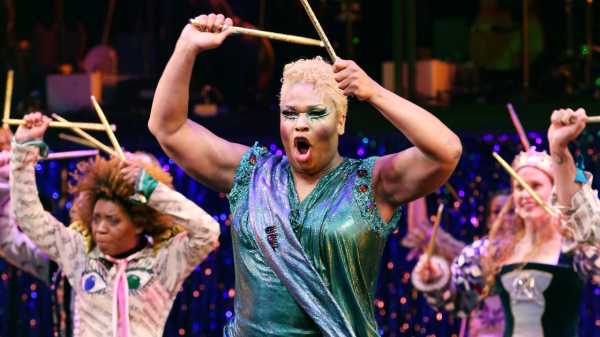
You just never know when high-school Latin is going to come in handy. The new Broadway musical “Head Over Heels,” at the Hudson Theatre, opens on a trompe-l’oeil backdrop of a classical archway, complete with Corinthian columns and an entablature festooned with Roman statuary—what you might expect to see at the start of “Coriolanus.” Above the arch are the faux-engraved words “HABEMVS PERCVSSIO.” Loosely translated: “We got the beat.” Even if you didn’t spend senior year reading the Aeneid, you can probably guess at the meaning, thanks to the hand-jiving, period-costumed actors singing the line right at you.
Conceived by Jeff Whitty and adapted by James Magruder, “Head over Heels” is a bouncy, bizarro, occasionally didactic musical combining three seemingly incompatible ingredients: Sir Philip Sidney’s sixteenth-century romance “The Arcadia,” an up-to-the-moment trans-positive message, and—why the hell not?—the songs of the Go-Go’s. The amalgam is so brazen as to be immediately disarming: it would take a truly bad sport not to get on board with ersatz Elizabethan verse (“Please ventilate the belfry of thy mind”) side by side with eighties earworms like “Our Lips Are Sealed,” delivered with equal gusto by a game cast.
Sidney called his tale a “trifle,” and Michael Mayer’s production revels in postmodern whimsy. The plot is inconsequential, but here we go: in a kingdom famous for its beat (see how that works?), King Basilius (Jeremy Kushnier) has two daughters, the vain Pamela (Bonnie Milligan, who steals every scene she’s in) and the humble Philoclea (Alexandra Socha), whose heart belongs to a sweet shepherd named Musidorus (Andrew Durand). Basilius visits Pythio, the Oracle of Delphi, who delivers a terrible prophecy, involving royal adultery and a love consummated without a groom. If, after all this comes to pass, the king does not cede his crown, the kingdom will lose its beat and thus plunge the known world into darkness and hellfire. Call it climate change.
More significant than this dire omen is the casting of the oracle. The role is played by Peppermint, an alumna of “RuPaul’s Drag Race,” billed as the first openly transgender woman to originate a major role on Broadway. Fortuitously, just down Forty-fourth Street, at the Helen Hayes, Young Jean Lee’s play “Straight White Men” features two trans actors: Kate Bornstein, the non-binary performer and gender theorist, and Ty Defoe, a two-spirit member of the Oneida and Ojibwe nations. (Their notable predecessor is Justin Vivian Bond, the non-binary cabaret star who headlined “Kiki & Herb: Alive on Broadway,” in 2006.) That these three actors are débuting on Broadway in the same week, and in roles that place them in positions not of marginalization but of authority, is worth cheering. In a cheeky inverse of the privilege pyramid, Bornstein and Defoe, who welcome the audience and nudge around the actors (including Armie Hammer and Josh Charles) during scene changes, play characters called “Person in Charge 1” and “Person in Charge 2.” King Basilius, meanwhile, asks the oracle, “Art thou man or woman?” The oracle answers snappily, “How is gender germane to the discussion?” The king’s viceroy suddenly gets it: “Neither he nor she, but . . . they. You are they.” Is this history’s first woke viceroy?
The epiphanies don’t end there. Pamela, the lusty, self-loving princess, finds herself drawn to the viceroy’s daughter, Mopsa (Taylor Iman Jones), and gets in touch with her sapphic side. Musidorus, the shepherd, cross-dresses as an Amazon warrior to infiltrate his beloved’s chambers, and is so appealing in his breastplate and wig that soon every member of the royal family develops a crush on him. As in Shakespearean comedy, all is swiftly untangled, but with a genderqueer twist: Musidorus, having grown attached to his female alter-ego, wonders if she isn’t an essential part of his identity, worth keeping around. And the king, as the resident straight white man, vows to listen more and submit to matriarchy. Queer Tumblr couldn’t have imagined a better outcome, one that gives the audience a momentary fantasy of a world more progressive than our own—never mind the doublet and hose.
What does all of this have to do with the Go-Go’s? As an all-women outfit, the band isn’t irrelevant to a show about female empowerment, even if it’s one written, directed, and choreographed by men. From its start in the late-seventies L.A. punk scene, the group turned out buoyant pop hits like “Cool Jerk” and “Vacation” (which Mopsa belts out during a jaunt to the Isle of Lesbos). Belinda Carlisle, the lead vocalist, broke out on her own in the mid-eighties, and the show includes a number of her solo hits, including “Heaven Is a Place on Earth,” performed as an erotic shadow play. The familiar tunes give the tale a welcome infusion of nostalgia—depending on what long-ago carpool they transport you to—but the catalogue is puddle-deep. Unlike, say, the Abba songbook, there isn’t much sonic variety or weirdness to distinguish one peppy dance number from the next, and too much Go-Go’s can blend into one enervating beat.
If “Head Over Heels” has a jukebox-musical ancestor, it’s probably “Xanadu,” the 2007 self-parody that paid tongue-in-cheek tribute to the cult 1980 film. Using the synth-y œuvre of Electric Light Orchestra, “Xanadu” told the unlikely story of a Greek goddess descending on a Venice Beach roller disco. “Head Over Heels” has a similarly kooky premise, but the script isn’t as clever or as self-aware. It could use a character to take the piss out of the whole bubbly enterprise, the way that Jackie Hoffman, as a cranky muse, did brilliantly in “Xanadu.” The oracle comes close, particularly when invoking that most mischievous of muses, RuPaul: “Thou better workest!” Talk about preferred pronouns.
Sourse: newyorker.com






